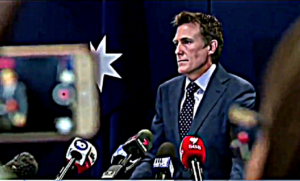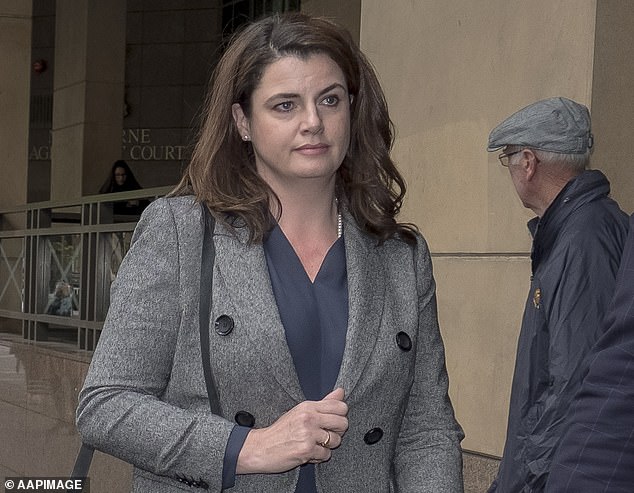The devolved state of journalism at the $1.2 billion Australian Broadcasting Corporation is now on full display.
The current witch hunt of the nation’s Attorney General over entirely unsubstantiated claims of an alleged rape 33 years ago, when he was a teenager, is a classic case in point.
What amazes old-timers like myself is that any of it even went to air.
The national broadcaster’s narrow range of left wing obsessions, gender politics, refugees, climate change, indigenous disadvantage and multiculturalism, entirely ignore the lived experience of mainstream Australians and are the primary reason for their declining influence and poor audience numbers.
Now they’ve taken it all to a whole new level.
The hunt for Australia’s chief law officer began in November last year with a broadcast portentously titled Inside the Canberra Bubble. It featured “investigative journalist”, the ABC’s Princess of Woke Louise Milligan, as presenter and leader of the charge.
The program’s central claim was that Parliament House has a culture toxic to women, and featured an array of well known, and yes, taxpayer funded, gender warriors, including former NSW Premier Kristina Keneally. Her blockbuster claim was that some men hit upon her, that is flirted with her, perhaps clumsily, at a function she attended without her husband.
Every last person appearing on Inside the Canberra Bubble had an axe to grind, not least the heavily featured former Prime Minister Malcolm Turnbull, who has been as vindictive in defeat as he was self-aggrandising in office.
If Turnbull doesn’t despise Christian Porter he’s certainly willing to throw him under a bus, perhaps because of the role Porter played in Turnbull’s overthrow in an internal party coup in 2018.
Turnbull has now appointed himself the saviour of Australian women, claiming amid lingering shots of Canberra watering holes and entwining feet, that the governing culture shows a “lack of respect for women”.
Turnbull is frequently quoted, never contradicted, and there is no attempt to put his manipulative spite into context.
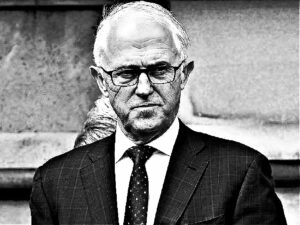
Christian Porter was the target of that first broadcast, and now, four months later, has been brought down by a howling media mob.
It is another scalp for the Australian Broadcasting Corporation’s star reporter Louise Milligan, fresh from her Cardinal George Pell debacle, during which she led a three year “investigation” of child sex abuse, again based on entirely unsubstantiated allegations.
“Without a doubt this is the toughest story I have ever done,” Milligan claimed. “This is a person who had immense political and cultural power so taking that on is enormous and very, very stressful. Being at the centre of this storm, it doesn’t get any harder than that as a journalist.”
Pell went to jail, only to be finally exonerated in a unanimous decision by the High Court of Australia.
But by that stage much of the nation, convinced of his guilt. would have happily seen him hang. Milligan never apologised.
She moved on to the Attorney General.
A handsome man from a patrician background, Porter’s main crimes as displayed in that first broadcast were to have been a bit of a lad at university, to have been partial to a party throughout much of his life and to have a liking for the company of women.
Shoot me now.
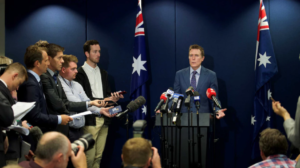
Parliament House is haunted by a new and truly insane puritanism.
Inside the Canberra Bubble was so prejudicial and so poorly based it should never have seen the light of day.
The sight of two of the country’s most privileged women, Sarah Hanson-Young of the Greens and Louise Milligan of the ABC, discussing on film how a third woman may have felt “trapped” by an affair with a cabinet minister has to be seen to be believed and epitomises all that is wrong with the public broadcaster.
Purveying this as “investigative journalism” is a sad joke.
Human lives are often messy. Not everyone thinks monogamy is a human ideal. So damn what?
The unsubstantiated accusations that Porter may have been involved in raping a fellow student when he was a teenager began circulating in December last year, after the broadcast of Inside the Canberra Bubble. Journalists were alerted to the story through an anonymous letter.

The accusations were made by a reportedly gifted but mentally ill woman who never made a formal complaint and had attempted to kill herself several times. The quasi-journalism that turned those accusations into a national issue and a major threat to the government, encased in the solemnity of theme music and lingering, atmospheric shots of parliamentary corridors, have become tantamount to fact.
Any journalist working on a mainstream outlet encounters mentally ill people on a regular basis. “They’re following me everywhere. You have to do a story.” And any normal journalist without an agenda shows them kindness but pays them no heed.
Christian Porter, in an unwise move, outed himself as the subject of the anonymous letter at an extremely emotional press conference, allowing the media to go straight into a shark attack frenzy while providing the fodder for women’s marches around the country.

And allowing Louise Milligan to produce a followup program, Bursting the Canberra Bubble, which was just as execrable as Inside the Canberra Bubble.
Her old employer, The Australian, has described her latest efforts on Christian Porter as plumbing “the depths of unprofessionalism”. Other conservative leaning news sites have been equally vitriolic.
What has made Porter’s demise so pivotal and his media sledging so consequential is that he was regularly touted as a future Prime Minister at a time of increasing discontent over the leadership of incumbent Scott Morrison.
The only other real contender in a largely talentless deck is Minister for Home Affairs Peter Dutton, whose social conservatism appeals to the traditional elements of the Liberal Party. He is loathed by the left and their media sympathisers because of his hard line stance on illegal immigrants. But don’t expect any stories about Dutton’s wild youth and partying ways. A staunch family man, he went straight from high school into the police force and has never so much as had a cup of coffee.
The Turnbull menace behind Porter’s public hanging is in plain sight.
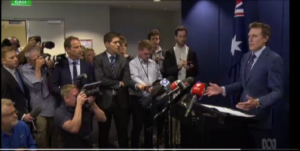
But there is strong speculation that the timing and framing of the stories targeting Christian Porter, their nature of contextualising slurs and the febrile atmosphere from which they are birthed, are related to Christian Porter’s abolition of the Family Court of Australia and its merger with the Federal Court.
I sat next to Louise Milligan for some two years when I worked as a general news reporter at The Australian. I am familiar with her work.
Almost 20 years ago I wrote a story of a major scandal within the Family Court of Australia, leaked to me by one of the court’s former judges.
The story took weeks to write and was done in close consultation with both the paper’s Editor-in-Chief and the informant. Great effort went into ensuring it was 100% watertight.
The story involved the mass resignation and recommissioning of Family Court judges in secret in order to extend their retirement ages.
The move was seen by my source, then still a very senior and well respected legal figure, as a breach of the Australian Constitution, which declared that judges could only serve until the retirement age set at the time of their appointment. For the Family Court that was was 65.
The retirement age of Family Court judges was set at less than the traditional 70 years because it was felt that due to the unique nature of the jurisdiction they should be kept closer to changing social mores.
Only a very few judges, including my informant, left the court on a matter of principle – that is refusing to participate in actions they saw as a direct and serious breach of the Constitution.
Hours before scheduled publication the paper decided to get Louise Milligan, who has a law degree, to check over and rewrite the story. The thinking being that as a separated father I might be biased on the issue.
But a staunch feminist dealing with a story on that great feminist icon the Family Court, they couldn’t possibly be biased?
The entirely eviscerated result, published on page two the following day, barely made any sense. I had to continue sitting next to Milligan for several more months. I didn’t dislike Milligan as a person. But I certainly disliked her style of journalism.
I later apologised to the informant judge when I ran into him at a function. “I knew it wasn’t you, John,” he replied.
To this day the documents recording those resignations and recommissionings remain secret.
Last year details of the scandal were passed to One Nation leader Pauline Hanson, who headed a recent inquiry into family law. They are also believed to have been passed on to Christian Porter.

After decades of expensive and completely useless government inquiries, hundreds of thousands of damaged children and even greater numbers of destroyed or embittered litigants, not always fathers, Christian Porter is the first politician to have stood up to powerful interests invested in this debacle.
The Turnbull menace behind Porter’s framing is in plain sight.
But there is strong speculation that the timing and framing of the stories targeting Christian Porter, their nature of contextualising slurs and the febrile atmosphere from which they are birthed, are related to Christian Porter’s abolition of the Family Court of Australia and its merger with the Federal Court.
With very little fanfare, legislation passed through parliament in February to merge the Family Court with the Federal Court, effectively abolishing it.
Whether the long hidden story of the judge’s mass resignations and recommissionings fed into the abolition of the court we may never know. Certainly some people close to the story think so.
To this day I believe it is a story that should not have been killed off.
Known colloquially as the Palace of Lies, the Family Court of Australia was established in the mid-1970s, at the height of the “all men are bastards” style of feminism which was then infiltrating courts and tertiary institutions throughout the Western world.
The demonisation of perfectly decent fathers as patriarchal abusers has been one of the great intellectual deceits of the Australian public service, and caused enormous damage both to individuals and to the social fabric of the nation.
WA Law Reform Commissioner and Law Professor Augusto Zimmermann said a dark stain on the nation’s legal, social and political history is finally being removed.
“There is speculation that the hunting of Christian Porter is simply a bit of Canberra femocracy payback for the destruction of their beloved Family Court,” Professor Zimmerman told A Sense of Place Magazine. “At the very least the timing is uncanny. There is an old saying: ‘There is no such thing as coincidence.’ ”
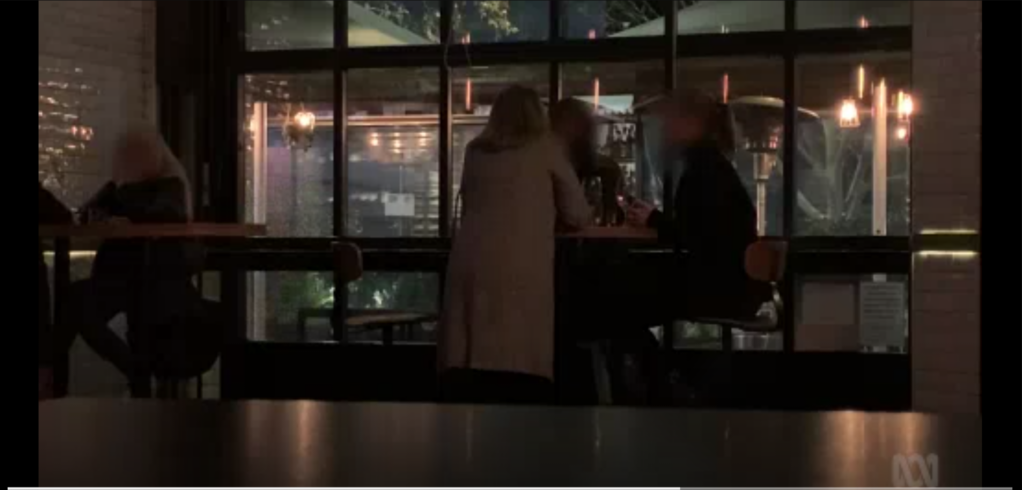
Certainly the travails of the Attorney General, who is now suing the ABC and Louise Milligan, has been met with little or no sympathy from separated fathers, many of whom have lost contact with their children on the basis of false and entirely unsubstantiated claims of domestic violence or sexual abuse of children.
As one Facebook group calling itself Domestic Violence Awareness Australia put it: “The Attorney General now understands how damaging allegations of sexual abuse and/or domestic violence are when made against a man by a woman, no matter how powerful his position or standing. Now perhaps, and especially if you are actually not guilty of the allegations raised against you now, you might finally understand how it feels.”
Once upon a time journalists told stories. Other people’s stories. The nation’s stories.
The turbulence of daily life, the dishonesty of councils, courts, corporations and an ever colourful parade of ne’er-do-wells were all grist to the daily news cycle.
Now we are seeing, on open ground, the full consequences of the sad devolution of journalism away from its original story telling functions.
The extreme bias of the Australian Broadcasting Corporation lies not only in the stories themselves, but in the stories they don’t run.
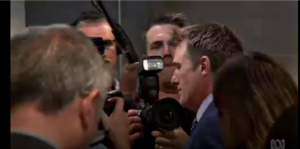
The ABC’s incessant feminist advocacy and complete failure to investigate the scandals circling the Family Court of Australia, including the many questions over legitimacy raised by the secret resignations and recommissioning of its judges to circumvent the Constitution, has real life consequences.
While endlessly pursuing stories on minorities and victim groups the ABC has ignored the declining fortunes of Australia’s working classes and the almost complete collapse of its now ice riddled underclass, events which will prove to have profound effects on the nation’s future.
Given the circumstances, the Australian Attorney General should have the last word.
At his press conference a highly stressed Christian Porter, in words that many Australian fathers could sympathise with, said: “I have been subject to the most wild, unrestrained, intense series of accusations I can remember in modern Australian politics. Maybe that is the new normal. I hope for everyone’s sake it is not.”
This piece was written and compiled by veteran Australian journalist John Stapleton.
A collection of his journalism is being constructed here.

